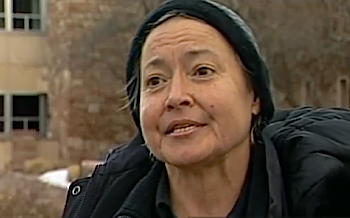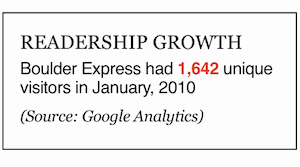Council says “yes” To Boulder’s homeless
Rob Smoke | Feb 8, 2010
More than 1,600 illegal camping tickets have been given out over the past four years, mostly for sleeping in public spaces that provide “shelter.”
Therein lies the rub: the ordinance states that a person must be using shelter of some sort to merit a ticket, and police have cited shelters that include a car (okay), a tree (huh?) or a blanket (oh, really?). If it was raining and you were sitting on a park bench with an umbrella, you could technically be cited for illegal camping since the umbrella would be your “shelter.”
The Boulder City Council considered a moratorium on issuance of such camping tickets at their Feb. 2 meeting. It was the second time homeless advocates — including many homeless folks themselves — have appeared before the Council recently to plead their case.

Homeless advocate Terri Sternberg
Before the Council meeting, I met with her at the Carriage House facility, where she works helping other homeless people on a daily basis.
We talk about the ACLU victories for the homeless in California, the fact that our current law in Boulder is for sleeping under “shelter,” and how, in its essence, it criminalizes poor people for needing sleep. Over the years, and recently in the case of a young man named David Bennis, a violator has refused a plea bargain and demanded a jury trial (that case goes to trial Thursday, Feb. 11).
How about using enforcement money…
Terri asks, reasonably: What if we took all the money from the police time, the prosecuting attorneys, the legal-aid attorney, the arrest costs if people don’t show up for their court appearance, and the 70 bucks a night it costs to keep someone in jail, and put it towards just providing more assistance, such as a more indoor shelter? Wouldn’t that say a lot about this city, and wouldn’t it be smarter?
She may have a point. In fact, it was a point made effectively by numerous speakers at the Feb. 2 meeting. One of them noted that historic figures like Davy Crockett and Daniel Boone would be criminals under Boulder’s law. The words of the poet/novelist Anatole France were cited: while it may be equally illegal for the wealthy and the poor to steal bread (or sleep under a bridge), a poor person would be the only one to get busted for it.
Council members juggled their feelings of compassion — mention of which billowed in all directions — against the will of at least some constituents who would prefer that Boulder do what Colorado Springs reportedly does: give homeless people a bus ticket to the out-of-town destination of their choice.
Municipal Court Judge Linda Cooke testified about the role of her court in treating the homeless with compassion. She noted that, of the 1,600-plus tickets written in the past four years, almost all were paid for with community service. Homeless advocate David Ward commented that, rather than having homeless people do community service, perhaps community members could do service helping the homeless get back on their feet. (Ward’s organization, Nice World, assists homeless people by offering them temporary employment and by doing “eviction rescues,” helping them place their belongings in storage.)
Economy has bred homelessness
Several people challenged the stereotypical notion that homelessness results from wrongdoing or bad living, noting that many of the homeless are primarily victims of the crashed economy. Many cautioned that the presence of the homeless among us should be a wake-up call to officials: unless they address the issue now, it may well just get worse.
Council, arguably, isn’t ignoring the problem. While they rejected the notion of a moratorium on enforcing the anti-camping ordinance, they were unanimous in their desire to do more to address homelessness. They pledged more funding for Boulder Outreach for Homeless Overflow (BOHO), an organization that works with local churches to provide warming centers — alternative shelters that provide relief from the cold, though not beds — during winter months. (The amount of that extra funding was yet to be determined.)
Ken Wilson, perhaps better known for his championing of “economic vitality” assistance to business, pitched in by pledging to coordinate an effort to get other Boulder County municipalities involved in finding solutions. Presently, Boulder is the only city in the County hosting a homeless shelter.
Although advocates agreed that the camping tickets “criminalize poverty,” city staff and Council were not buying this analysis. Police chief Mark Beckner emphasized the discretionary nature of the ticket and the fact that officers often use the threat of a camping ticket to compassionately persuade violators to seek shelter. Some of the homeless people said they hadn’t found the police all that compassionate.
Demand exceeds supply
So here we are, in the middle of winter. Demand here has vastly outstripped capacity: there are an estimated 560 people homeless in Boulder and only 160 beds at the Boulder Shelter for the Homeless. The shelter, on N. Broadway, has a waiting list, and BOHO’s overflow facilities in Boulder only open if it’s below freezing (with precipitation), or below 25 degrees (without precipitation).
It may be a case of language barrier; homeless advocates were speaking from their — albeit tattered — hearts. While Council members insisted they were supportively doing the same, their answers tended more toward the more bureaucratic language spoken around City Hall. The Council concurred with staff that a moratorium on the camping ordinance — even a temporary one for cold winter nights — was probably too simple of a solution. And, as for their professed support for other measures to assist the homeless, well, let’s just say that time will tell.
From there, the Council moved on at their Feb. 2 meeting to discuss public nipple exposure and defining a proper police reaction to those who would run naked with pumpkins on their heads.


